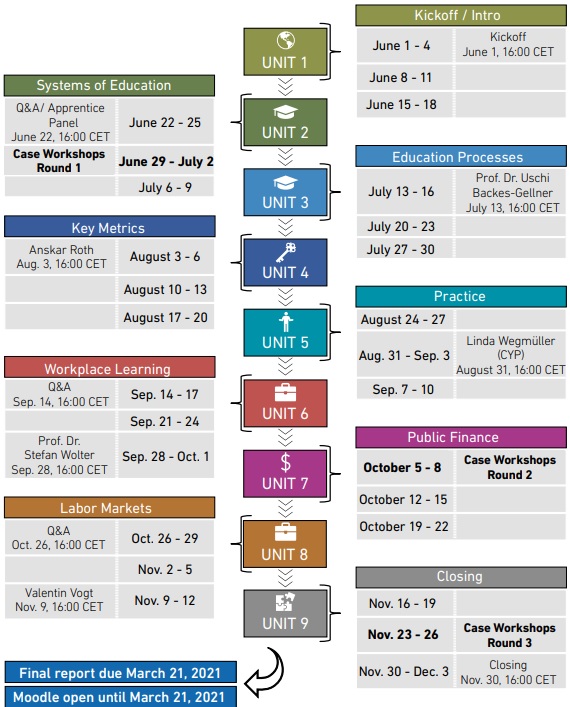CEMETS Virtual Institute
The CEMETS Institute is an education systems reform lab, occurring annually since 2015. It is a unique learning experience for policymakers that translates science into policy. Participants join in teams with a reform case relevant to their own education systems. The reform lab has hosted teams from 17 countries on all 6 continents, including developed and developing economies, multiple American states, and philanthropic organizations.
Participants learn theory and new empirical findings from experts, meet leading practitioners, and refine their own reform and implementation plans. They meet other high-level reform leaders from all over the world and form a global community. While these institutes were previously held on campus, we shifted the institute to a virtual format in 2020 due to the COVID-19 pandemic.

Implementation of the course during the time of distance learning
The 2020 CEMETS3 institute was scheduled for ten days in June, 2020. During the shutdown in April 2020, we contacted participants to announce the switch to a virtual format beginning in August. Our first priority was to maintain the combination of research, practice, and casework. We wanted to encourage participant interaction with us and with one another, and foster community development.
The 2020 virtual institute included a record 125 participants from 12 teams. Without space limitations, we were able to serve more than twice as many participants as an in-person institute. The virtual institute was also cheaper. Our switch to a virtual format accelerated the scaling of the institute to an even larger and more inclusive global audience.
We initially planned a semi-virtual format, with an in-person institute in early 2021 with field visits to explore how a high-performing dual education system operates. We later transitioned to a fully virtual course with a two-week intensive of daily live virtual events in February 2021 and more online content. We produced videos
to explore training companies virtually and hear from high-level leaders in Switzerland. We invited keynote speakers from Switzerland and other countries, including the President of the Republic of Serbia and American enterpreneur Noel Ginsburg. These speakers shared their success stories based on previous institutes and reform plans. Asynchronous content like vlogs from Swiss apprentices helped participants prepare for live discussions.
We interacted with participants in five main ways: through discussion forums on Moodle, via email, in live events, surveys, and during case workshops. Participants further interacted with one another through live events and discussion forums, and with their own teammates through preparation for case workshops and metacognition casebooks.

Participants found monthly live Q&A sessions extremely valuable, and we had nearly full participation in all of them. Therefore, the course content was approximately 40% asynchronous (mostly video lectures, discussion forums, surveys for related research and benchmarking), 50% synchronous (Q&A sessions, live events), and 10% team-based (group discussion boards, group assignments, team casebooks).
Our chair, the Chair of Education Systems, began a research project at the start of the pandemic to collect and report data on the impact of the COVID-19 pandemic on dual education and training in Switzerland4. Because the institute was longer and included regular meetings, we were able to share up-to-the-moment findings and relevant insights to our participants. They, in turn, used that information in their role as system leaders to steer their own countries’ and states’ education systems through the pandemic. For example, we shared how companies are adjusting workplace learning to ensure apprentices’ safety and how different strategies impact learning. Furthermore, this presentation generated a research project on “Training for Recovery” in US states.
Course description
Overall concept of the course before the pandemic - during - after
In a matter of a few weeks, we re-invented CEMETS as an online lab for our global community. We built a course on Moodle with lecture videos and combined that with live sessions, group forums, and small research projects. The virtual format made it easier and cheaper for participants to join the course, prevented visa and logistical issues, and greatly lowered our carbon emissions.
The learning experience that CEMETS has institutionalized is a key part of ETH Zurich’s research and outreach efforts. Reform labs translate research to the leaders while creating a community of alumni that stays connected to ETH researchers. The lab is making an impact: our study of the 2015-2019 institutes demonstrated their enduring impact on participants’ knowledge, leadership, and reforms. Reforms designed at the lab also have impact: CareerWise Colorado (Colorado USA, 2015) is the USA’s first state-wide youth apprenticeship program and is already piloting in other states.
Our reform lab concept has changed due the COVID-19 pandemic. In going virtual, we strove to maintain and improve the institute’s effectiveness, its case-focused approach, and its development of a global reform leader community. We are aware that our teaching impacts education systems’ responses to the pandemic and other pressing issues. The virtual institute enabled us to reach a broad and diverse group of leaders and work with them closely, even more so than we could do when travel and in-person teaching were possible.